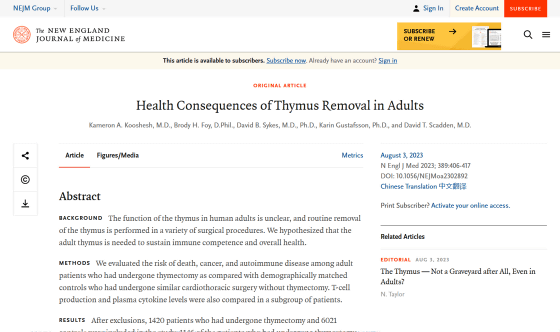Research results that people whose organ ``thymus'', which was thought to be useless in adults, were removed, tripled the risk of subsequent death

Health Consequences of Thymus Removal in Adults | NEJM
https://doi.org/10.1056/NEJ Moa2302892

Turns out lowly thymus may be saving your life – Harvard Gazette
https://news.harvard.edu/gazette/story/2023/08/turns-out-lowly-thymus-may-be-saving-your-life/
Doctors have long considered the thymus expendable. But could removing it be fatal? | Science | AAAS
https://www.science.org/content/article/doctors-have-long-considered-thymus-expendable-could-removing-it-be-fatal
'Useless' Organ That Doctors Often Remove May Actually Fight Cancer : ScienceAlert
https://www.sciencealert.com/useless-organ-that-doctors-often-remove-may-actually-fight-cancer
The thymus is the organ involved in the immune system and is where immature lymphocytes mature to become T cells that can fight off pathogens. However, as the thymus grows, it rapidly ages and almost stops producing cells, and after puberty it rapidly atrophies and is replaced by adipose tissue. Therefore, it is not considered a useful organ for adults and is sometimes removed to make room during heart surgery.
In recent years, however, the idea that the thymus continues to produce T cells that contribute to the overall diversity of T cells even after adulthood and has a significant impact on adult health has been spreading. Therefore, a research team led by Professor David Skadden of Harvard Medical School conducted a study to analyze the medical records of patients who underwent chest surgery at Massachusetts General Hospital .

The 1,146 thymectomized patients included in the study underwent thymectomy surgery, including for treatment of thymic carcinoma and
Patients who had a thymus removed also had a two-fold higher risk of developing cancer, and cancers in patients without a thymus were more aggressive and more likely to recur than those in patients with a thymus. Ta. This trend was observed even in those with no history of cancer or myasthenia gravis, suggesting that thymectomy itself led to increased mortality.
In addition, the research team analyzed plasma collected from 22 patients who had thymus removed and 19 patients who had thymus to investigate how thymus removal affects the immune system. Did. They found that thymectomized patients had fewer biological markers of the production of new and different types of T cells, a decrease in T cell diversity, and a possible cause of the inflammatory response. It was also found that there are many pro-inflammatory cytokines that become
``Together, these findings support that the thymus contributes to the production of new T cells in adulthood and contributes to the maintenance of adult health,'' said the research team. I concluded that it is likely to have an important role even after

'The biggest surprise to me was the mortality and cancer rates in patients who had thymectomies,' said Kameron Kooshesh, lead author of the paper and a researcher at Massachusetts General Hospital. 'These findings suggest that the absence of the thymus affects a fundamental aspect of immune function.'
'The magnitude of the risks from a thymectomy was not what we expected,' Skadden said. '' and argued that more attention should be paid to the risks involved in removing the thymus.
Related Posts:
in Science, Posted by log1h_ik







